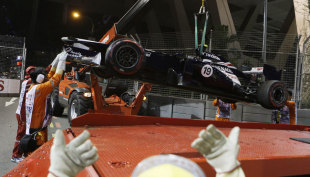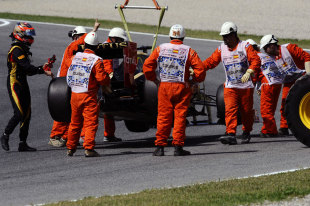- GP Week
And at the weekend...

Standing downwind from a powder fire extinguisher at full blast in the Oulton Park pitlane, I'm not quite sure whether this is one of those glass hammer or long weight moments. I've been spending the day observing marshals in their natural habitat, and I have a feeling they might be taking the piss.
"Breathe enough of that in and you'll spend the night on the toilet," one of the pitlane marshals warns me, a massive grin on his face. With the small fire extinguished easily, the focus has moved on to cleaning up the mess the powder has left behind and reopening the pitlane. Josh Pickett, chief pitlane marshal and an old hand at this, is busy brushing up the powder with its alleged laxative properties.
I decide not to risk it, and move away from the clouds of dust just in case. My day spent learning how to marshal got off to a very early start, with a 4am wake-up call necessary to make it to Oulton Park in time for the 8am signon. Bacon sandwiches and strong coffee were the order of the day upon arrival, and it was good to see that some things remain sacrosanct in motorsport, from the club to the international level.
I was volunteering for the MG Car Club summer race meeting, courtesy of Paul Sutcliffe, national membership secretary of the British Motorsport Marshals Club (BMMC). The day had been arranged to give me the full spectrum of the marshalling experience, from a morning spent trackside, doing flagging, to an afternoon that culminated in gridding the cars, a surreal experience that involved running down a live grid with cars coming towards us, pointing each machine at its relevant grid slot while checking them all off on a list. The rest of the day was just as varied, from watching as the trained marshals dealt swiftly with an unplanned pitlane fire to directing cars and drivers to scrutineering or the stewards, as relevant.
Over the course of 11 races I was able to observe the full gamut of a marshal's duties, although as an untrained novice I was fit for little more than waving flags to mark the end of a session. But for those who come along for a day's taster training - something the BMMC offers for the curious - the opportunity exists to get fully involved.
And for the passionate motorsport fan, there is no better way to get involved in the sport than to volunteer as a marshal. It is hard work, but offers a level of access like no other, with the ability to watch racing from close quarters or spend an afternoon in the pitlane. While some might be attracted by the prospect of marshalling for an international event, such as a Formula One Grand Prix, thousands of opportunities exist at club level events around the world. Grass roots motorsport is a smaller community, and affords volunteers with the opportunity to work their way through the ranks, gaining the skills needed to run races at a local level.
The marshals I worked with at Oulton Park had years of experience - decades, in some cases - under their belts. Many of the younger marshals had learned the ropes courtesy of a parent who also volunteered, and there were generations of the same family in matching fireproof overalls. Other countries with a rich motorsport heritage can also boast of marshalling as a hereditary passion. Jeff Benham, a long-time volunteer across a range of Australian motorsport events, including the Formula One Australian Grand Prix, started out following his father's footsteps into the world of motorsport.
"I have always loved the sport," he explains, "even when I was a kid. Other boys liked football, etc., whereas my passion was always racing. Growing up, my dad was always involved in motorsport as a volunteer. Before he had kids he raced and crewed for various teams. When I was old enough I wanted to go and get involved. As the minimum age is 16 I had to wait until the mid/late '90s to officially be registered as a working volunteer."
A more recent convert is Fan Peiyi, a volunteer marshal at the Singapore Grand Prix.
"I have been watching F1 since 2007 and ever since the event came to Singapore in 2008, I have been a spectator and a keen fan heading to multiple drivers' events," Fan explains. "In 2010, I met a friend who told me that she was volunteering for the race and honestly, I did not know someone could do that! I immediately signed myself up for 2011. I really do think that volunteering completes my experience as a F1 fan. Since I cannot be in the race driving, I will be part of the race marshalling."

As a new(ish) race, Singapore has had the responsibility of training hordes of volunteers from scratch. As a result, the race organisers have put together a very comprehensive training programme.
"There are several stages of training for marshals," Fan explains. "For fresh marshals, we have to go through a 'General officials module' to get introduced to race officiating and the basic duties of a marshal. Then, we go through a 'Basic Trackside module' to learn more about the technical side of racing, such as the racing line, meaning of flags and the Safety Car. Afterwards, we are notified of our specific roles and we attend the specialist module. For returning officials, we go through a refresher course first then move on to the specialist course.
"During the specialist modules, we engage in group discussions and share our past experiences in dealing with a situation. We also view videos to play out scenarios and point out mistakes that we can learn from. During the race weekend, we have a speed test on Thursday and its purpose is to accustomed the marshals to their roles for the next few days. We were fully suited up and practised for different scenarios that could happen during the race, with the help of the Safety Car and Medical Car."
As a more experienced marshal, Benham worked his way up through the ranks when training was more informal. But as new safety developments emerge all the time, training as a marshal is an on-going process. "Training was on the job," Benham explains. "Now new officials have training as well as a mentor program. The further you progress through the system the more training that is required; you need to complete theory courses and practical assessments to upgrade your licence classification. Bronze to Silver and so on. You have to be at a certain level to fulfil certain positions at different events. At any time an official can enrol on any course to further develop their skills and broaden their knowledge."
Wherever you are in the world, marshals form a tight-knit group, borne partly out of the long hours spent together at observation posts. The sense of community was immediately obvious at Oulton Park, and it is something that extends across the world.
"It is really exciting to come back each time and see many familiar faces," Fan says of marshalling in Singapore every year. "For my sector, we had a 100 percent return rate from 2011, so I think that really speaks something about marshalling. A senior official once joked that it is actually more difficult to apply to be a marshal than to apply for a housing flat, because the returning rate is so high. Nevertheless, year after year we do see new faces in the big family and it is exciting to make new friends who share the same passion."
"The same can be said of Australian marshals," Benham adds. "The same familiar faces can be seen at several race tracks around the state. Some are even keen enough to travel all over the country to help the sport. The major international meetings - F1, Bathurst, Clipsal - are like big family reunions where everyone comes together from all over the country to put on the best show for the world to see."
"The best thing about being a marshal is knowing that I play a part in conducting the race," Fan concludes. "It means a lot to me, when I know that the driver sees my flag and acknowledges the meaning of it, or that a right call is made to the race control when they may have missed it, or picking up that piece of debris on track that otherwise could change a drivers' race. It is immensely satisfying to know that we contribute to the safety of the race."
"The best part about it is making an active contribution to a sport which I love," Benham admits, "plus the new friends you make along the way and the experiences you share. When I was young and stupid it was about hanging around the drivers and teams, but not everyone gets those opportunities. The camaraderie between the volunteers is like nothing else: we all work together as a team for the greater good of the sport. Sun, wind, rain even snow; I've experienced some amazing things trackside. Some good, others tragic. But I always know that the there is a team around me to share it all with."
There's no denying the sense of camaraderie and community that surrounds the marshals - two months after my day spent learning the ropes at Oulton Park, an invitation to their end of year get-together lands in my inbox.
Kate Walker is a blogger on ESPN and the editor of GP Week

